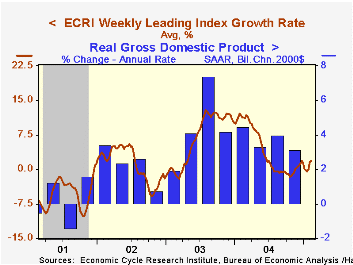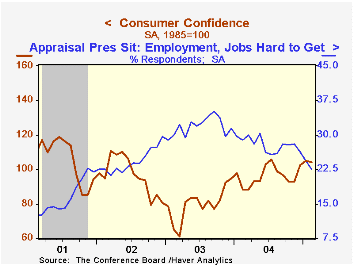 Global| Feb 22 2005
Global| Feb 22 2005ECRI U.S. Leading Index Trending Higher
by:Tom Moeller
|in:Economy in Brief
Summary
The Weekly Leading Index of the US economy from the Economic Cycle Research Institute (ECRI) resumed an up trend after stuttering around the new year. Flat in the latest week, the index in February is up 1.2% from January and the six [...]

The Weekly Leading Index of the US economy from the Economic Cycle Research Institute (ECRI) resumed an up trend after stuttering around the new year. Flat in the latest week, the index in February is up 1.2% from January and the six month growth rate improved to +1.9%, its best since early July.
Higher stock and commodity prices as well as lower interest rates offset fewer new mortgage applications in the latest week.
During the last ten years there has been a 69% correlation between the six-month growth in the ECRI leading index of the US economy and two quarter growth in real GDP.
The components of the ECRI weekly leading index are money supply plus stock & bond mutual funds, the JOC-ECRI industrial materials price index, mortgage applications, bond quality spreads, stock prices, bond yields, and initial jobless insurance claims.
The ECRI Leading Index's recent pattern generally mirrors the Conference Board's Index of Leading Economic Indicators, with a slight lead. Construction of the ECRI Leading Index differs from the Conference Board Index but there has been a 70% correlation between the y/y percent change in the two series over the last 10 years.
The median lead of the ECRI index at business cycle peaks has been 10.5 months and at cycle troughs 3.0 months.
The latest from ECRI is available here.
Productivity and Inflation from Janet L. Yellen, President & CEO of the Federal Reserve Bank of San Francisco, can be found here.
| ECRI Leading Index | 02/11/05 | 02/04/05 | Growth Rate | 2004 | 2003 | 2002 |
|---|---|---|---|---|---|---|
| Weekly | 134.3 | 134.3 | 1.9% | 4.2% | 6.6% | 1.1% |
| Jan | Dec | |||||
| Monthly | 132.7 | 133.2 | -0.1% |
by Tom Moeller February 22, 2005

The Conference Board’s Index of Consumer Confidence slipped in February to 104.0 from an upwardly revised January level of 105.1. Consensus expectations had been for a reading of 103.3.
The index of consumer expectations fell for the second consecutive month (+4.1% y/y). The present situation index added another 3.8% to strong gains in the prior three months (+39.7% y/y).
During the last twenty years there has been a 51% correlation between consumer confidence and the y/y change in real consumer spending. The correlation rose to 66% during the last ten years.
Perceptions of the job market improved further. Jobs were viewed as hard to get by 22.6% of survey participants, the lowest percentage since May 2002.
The Conference Board’s survey isconducted by a mailed questionnaire to 5,000 households and about 3,500 typically respond.
The Survey of Professional Forecasters from the Federal Reserve Bank of Philadelphia is available here.
| Conference Board | Feb | Jan | Y/Y | 2004 | 2003 | 2002 |
|---|---|---|---|---|---|---|
| Consumer Confidence | 104.0 | 105.1 | 17.5% | 96.1 | 79.8 | 96.6 |
Tom Moeller
AuthorMore in Author Profile »Prior to joining Haver Analytics in 2000, Mr. Moeller worked as the Economist at Chancellor Capital Management from 1985 to 1999. There, he developed comprehensive economic forecasts and interpreted economic data for equity and fixed income portfolio managers. Also at Chancellor, Mr. Moeller worked as an equity analyst and was responsible for researching and rating companies in the economically sensitive automobile and housing industries for investment in Chancellor’s equity portfolio. Prior to joining Chancellor, Mr. Moeller was an Economist at Citibank from 1979 to 1984. He also analyzed pricing behavior in the metals industry for the Council on Wage and Price Stability in Washington, D.C. In 1999, Mr. Moeller received the award for most accurate forecast from the Forecasters' Club of New York. From 1990 to 1992 he was President of the New York Association for Business Economists. Mr. Moeller earned an M.B.A. in Finance from Fordham University, where he graduated in 1987. He holds a Bachelor of Arts in Economics from George Washington University.
More Economy in Brief
 Global| Feb 05 2026
Global| Feb 05 2026Charts of the Week: Balanced Policy, Resilient Data and AI Narratives
by:Andrew Cates






